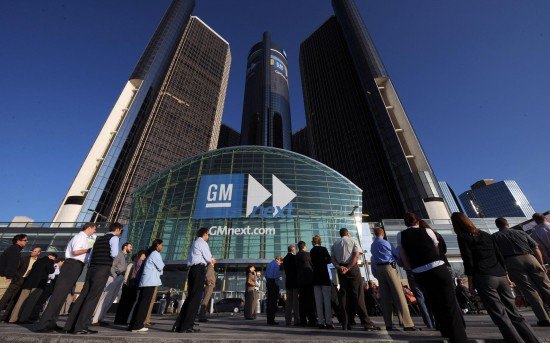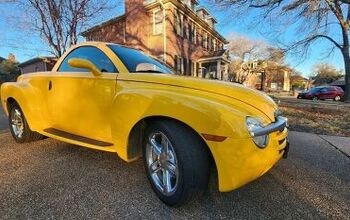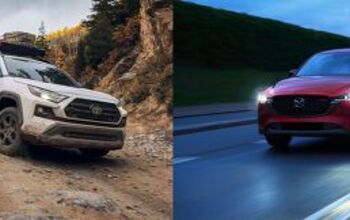Volkswagen's Cervone Returns To GM As Global Communications VP
Autoblog reports Volkswagen Group of America executive vice president of group communications Tony Cervone is returning to the GM fold as the automaker’s senior vice president of global communications. According to CEO Mary Barra, Cervone “brings an ideal mix of outside perspective and experience that compliments a deep background in GM and today’s global auto industry.” Prior to his return, he also served as the vice president of communications for United Airlines and Chrysler Group, where he spent 14 years before his decade-long previous service to GM. Cervone succeeds Selim Bingol — who resigned from the company in April “to pursue other interests,” and will report directly to Barra.
Speaking of “outside perspectives,” Automotive News chronicles the story of how a trio of Southern gentlemen helped to bring the spotlight upon the out-of-spec ignition switch at the heart of the February 2014 GM recall. Leading the charge, attorney Lance Cooper had sought answers into the death of Brooke Melton at the wheel of her 2005 Chevrolet Cobalt. Cooper retained a number of experts in his case, including auto shop owner Charlie Miller and materials engineer Mark Hood, both of whom discovered the switches in Melton’s Cobalt and related vehicles performed differently than those found in 2007 and later models. The evidence gathered would help cement the settlement for his client’s family, as well as pave the way for the recall.
Moving toward the present, victim compensation expert Kenneth Feinberg may end up sorting through a mountain of data as he works out the details for a compensation package between GM and the 35 families affected by the switch. Between the time the first vehicles left for showrooms in late 2002 through 2012, 1,752 individuals died in accidents involving the vehicles under the February 2014 recall. Though the link may be tenuous in most of the cases, each one may open an opportunity for affected groups to lay some of the blame at the door of GM’s comptroller.
Looking toward the future, GM and AT&T will offer a number of 4G LTE connected-car packages beginning next month to consumers, ranging from $5 for a few hours of streaming music to $50 for several showings of “Frozen” for the little ones in the back. However, demand for the service may not be what the automaker expects, as consumers who don’t have company on the road often may wonder why they need a connected car with 4G. The concern isn’t helped by the delay of an app suite — featuring offerings from NPR and The Weather Channel — which would allow owners access without using their smartphones; the delay is over quality concerns, according to GM.
In brand news, GMC is doing very well for itself as of late, being the healthiest among GM’s four brands left standing after the 2009 bankruptcy. The “professional-grade” line of trucks, SUVs and crossovers are leaving their bow-tied brethren behind for the premium market, bumping into Cadillac more often than may be comfortable for some within GM’s hallowed halls. That said, GMC’s demographic prefers to remain low-key in opposition to the flash that brings the celebs to Escalade’s yard, even if the Yukon XL Denali is within spitting distance of the Caddy’s $72,690 base price.
Leading the charge is Buick-GMC boss Duncan Aldred, who is looking forward to where GMC will go while shaking off the shadow of Buick’s “senior citizen” image within the United States. The former Vauxhall managing director sees similarities between Buick and Vauxhall/Opel, and aims to rehabilitate its image through a marketing strategy that may use “shocking and polarizing” messaging to prove his point. As for GMC, Aldred says he sees its future “as really exciting in an Audi-esque kind of way,” with plans to push the Denali line further up the mountain toward the summit.
Finally, CarNewsChina has the first official photos of the facelifted Chinese-market Chevrolet Aveo, which takes its looks from the upcoming Cruze. The Aveo will be priced between 81,800 yuan and 114,800 yuan ($13,113 to $22,732 USD), with power from 1.4- and 1.6-liter engines under the bonnet. Made by the GM Shanghai joint-venture between GM and SAIC Motor, the newly styled compact will arrive in showrooms in June for the sedan, July for the hatchback.
Seattle-based writer, blogger, and photographer for many a publication. Born in Louisville. Raised in Kansas. Where I lay my head is home.
More by Cameron Aubernon
Latest Car Reviews
Read moreLatest Product Reviews
Read moreRecent Comments
- Teddyc73 Oh look dull grey with black wheels. How original.
- Teddyc73 "Matte paint looks good on this car." No it doesn't. It doesn't look good on any car. From the Nissan Versa I rented all the up to this monstrosity. This paint trend needs to die before out roads are awash with grey vehicles with black wheels. Why are people such lemmings lacking in individuality? Come on people, embrace color.
- Flashindapan Will I miss the Malibu, no. Will I miss one less midsize sedan that’s comfortable, reliable and reasonably priced, yes.
- Theflyersfan I used to love the 7-series. One of those aspirational luxury cars. And then I parked right next to one of the new ones just over the weekend. And that love went away. Honestly, if this is what the Chinese market thinks is luxury, let them have it. Because, and I'll be reserved here, this is one butt-ugly, mutha f'n, unholy trainwreck of a design. There has to be an excellent car under all of the grotesque and overdone bodywork. What were they thinking? Luxury is a feeling. It's the soft leather seats. It's the solid door thunk. It's groundbreaking engineering (that hopefully holds up.) It's a presence that oozes "I have arrived," not screaming "LOOK AT ME EVERYONE!!!" The latter is the yahoo who just won $1,000,000 off of a scratch-off and blows it on extra chrome and a dozen light bars on a new F150. It isn't six feet of screens, a dozen suspension settings that don't feel right, and no steering feel. It also isn't a design that is going to be so dated looking in five years that no one is going to want to touch it. Didn't BMW learn anything from the Bangle-butt backlash of 2002?
- Theflyersfan Honda, Toyota, Nissan, Hyundai, and Kia still don't seem to have a problem moving sedans off of the lot. I also see more than a few new 3-series, C-classes and A4s as well showing the Germans can sell the expensive ones. Sales might be down compared to 10-15 years ago, but hundreds of thousands of sales in the US alone isn't anything to sneeze at. What we've had is the thinning of the herd. The crap sedans have exited stage left. And GM has let the Malibu sit and rot on the vine for so long that this was bound to happen. And it bears repeating - auto trends go in cycles. Many times the cars purchased by the next generation aren't the ones their parents and grandparents bought. Who's to say that in 10 years, CUVs are going to be seen at that generation's minivans and no one wants to touch them? The Japanese and Koreans will welcome those buyers back to their full lineups while GM, Ford, and whatever remains of what was Chrysler/Dodge will be back in front of Congress pleading poverty.


































Comments
Join the conversation
Well, this guy certainly has his work cut out for him.
I was hoping for JH but this will do.